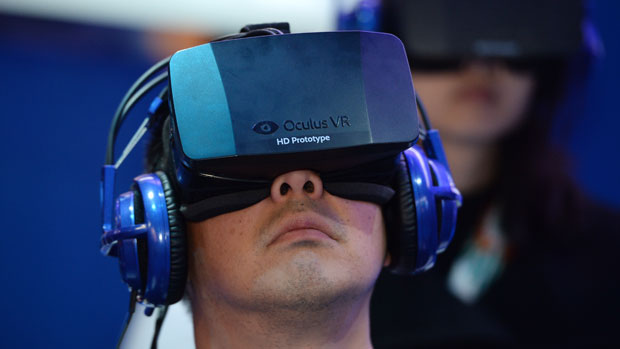Oculus: why has Facebook bought virtual gaming company for $2bn?
Tech community divided by Facebook's purchase of much-hyped virtual reality firm Oculus VR

A free daily email with the biggest news stories of the day – and the best features from TheWeek.com
You are now subscribed
Your newsletter sign-up was successful
SOCIAL media company Facebook has purchased the crowd-funded virtual reality firm Oculus VR for $2bn (£1.2bn).
Facebook founder, Mark Zuckerberg, said Oculus's virtual reality technologies could eventually "change the way we work, play and communicate".
The technology start-up was initially financed by online supporters who pledged money to the project through online donation.
The Week
Escape your echo chamber. Get the facts behind the news, plus analysis from multiple perspectives.

Sign up for The Week's Free Newsletters
From our morning news briefing to a weekly Good News Newsletter, get the best of The Week delivered directly to your inbox.
From our morning news briefing to a weekly Good News Newsletter, get the best of The Week delivered directly to your inbox.
The news has caused deep divisions within the technology community. Marcus Pearsson, the creator of the hugely successful block-building game Minecraft, immediately cancelled his collaboration with Oculus, The Guardian reports. "We were in talks about maybe bringing a version to Oculus," he wrote. "I just cancelled that deal. Facebook creeps me out."
Others have reacted more positively. Rami Ismail, co-founder of independent Dutch gaming studio, Vlambeer, described it as a smart move. "Outside of our bubble nobody has ever heard of [Oculus]. If VR is to be established as a market, we need the average consumer to know of it, so having Facebook and Sony in the fray is good news."
Last week Sony announced its own virtual reality headset, Project Morpheus, at the 2014 Game Developers Conference in San Francisco.
What is virtual reality? Virtual reality (VR) creates an immersive world, often through a headset that looks something like a blacked-out ski mask. Inside is a screen that projects images directly into a user's eyes.
A free daily email with the biggest news stories of the day – and the best features from TheWeek.com
The Oculus Rift headset has been in development since 2012. It began life on the crowd-funding platform Kickstarter, swiftly raising $2.4m – ten times as much as it has first sought. It subsequently raised another $75m from private investors to fund its continued development.
How close is VR to becoming a reality? Experts say that VR still has to overcome some serious technological challenges. "VR headsets face a significant problem that won't be overcome in the near term," James McQuivey of analyst firm Forrester told the BBC. "They're not good enough to keep up with the sophisticated way the brain processes visual and spatial information, including the user's own movement."
Oculus Rift has acknowledged that it has problems with lag, which makes some users feel queasy, but the firm says the problem will be ironed out before the Rift is released. The launch is expected sometime in the next year.
Why does Facebook want Oculus? VR was initially developed as a gaming tool, but analysts believe it could have a huge number of other uses in training, communication, therapy and beyond.
Robin Arnott, an experimental developer of VR titles including /Deep Sea/ and /SoundSelf/ told the Guardian that Facebook's purchase of Oculus could see the technology shift from being a tool for gaming to one used in communication: "I think Facebook is probably looking at the big-picture potential of VR outside of games – as a means of communication and sharing experiences. I can't imagine what they'll come up with together, but I have a feeling that it'll more closely resemble the holodeck [from Star Trek] than Farmville."
Why are some games developers so upset? Games developers fear that Facebook will look for ways to tie users to its proprietary social network environment and incorporate advertising into products developed for the Rift, the Guardian says.
Others are concerned that bringing the independent firm under a big corporate umbrella will kill off its creativity: "The FB acquisition of Oculus seems 80 per cent likely to kill their momentum... It's probably going to get locked down in annoying ways and stop being a cool weird tech you can freely hack on," developer George Buckingham said.
Where next? Commenting on the deal, Zuckerberg said: "Mobile is the platform of today, and now we're also getting ready for the platforms of tomorrow."
The purchase of Oculus adds to Facebook's impressive portfolio of new technology companies. The social network also recently purchased the WhatsApp messaging service for $19bn, and last year bought Instagram for $1bn.